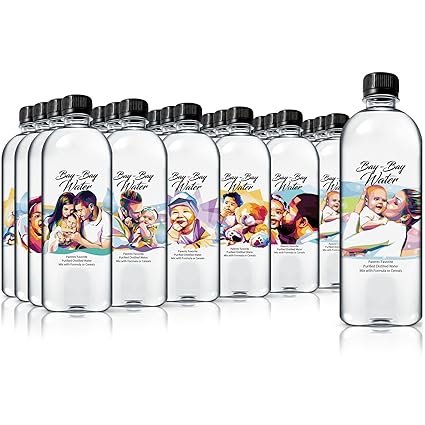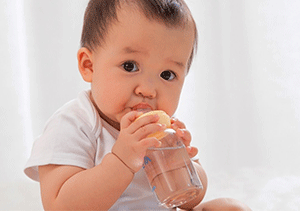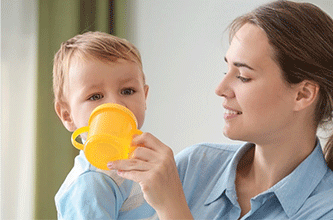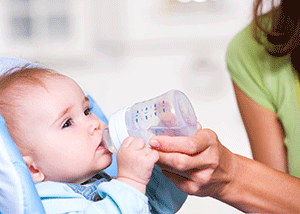Newborn babies have a sensitive tummy just like they are, so the only thing that they can drink or feed safely is your breastmilk. If your baby is less than six months, then never give plain water to your little angel as it can interfere with his nutritional needs.
Other Topics You Might Like
Helpful Products You Might Like

Bay Bay Water - Purified Distilled Water for Babies
RaZbaby Soft Silicone Infant & Baby Teether

Fisher-Price Baby Toy Soothe 'n Snuggle Plush Sound Machine
"(Paid Links)" 
At What Age can you Give water to your Baby?
In the first six months, water is not recommended for babies. Then, when your baby starts eating solid food, it is ok to give water to your little angel.
before this, your baby will get all the water he needs from the breast milk as it contains 80 percent
water.
When your little angel is six months old, you can offer a little water.
You can offer cooled boiled tap water to your baby in small amounts, but do not replace breastmilk or formula feeds. It is still his main drink up to 12 months of age.
After one year, their principal drink should be water and cow's milk or breastmilk. After that, you can offer water or milk in a cup.
After twelve months, there is no need to boil tap water.

How water interferes with the nutritional needs of your Baby

Baby tummies are pretty tiny. In fact, after birth, a baby's stomach can only hold about 1 to 2 teaspoons, or 5 to 10 milliliters (mL). It does empty fast — that is why your baby needs so many feedings in 24 hours. It is best to fill his tiny belly with nutrient-rich breast milk or formula.
So the main risk of giving water to your little angel is that you'll be filling his tummy with a pretty useless substance. So there will be no room for those vitamins, minerals, fat, and calories crucial for growth and development. So it can cause serious problems.
The Baby's tummy does grow over the first six months of life, but it's pretty gradual. When they're one month old, their stomach capacity is about 2.7 to 5 ounces. By six months, you can introduce little sips of water. At this time, your baby's tummy can generally hold about 7 ounces (207 mL) at a time.
Why is it not suitable to give water to babies younger than six months?
Before six months, breastmilk or formula work as food as well as water for your little angel. It is enough to fulfill his needs even in hot weather. If you give water to your baby, then he will0 drink less breastmilk or formula. It can put them at risk of not getting enough milk or formula to grow correctly.

Water intoxication
Water can be harmful to anyone if taken in large amounts. But unsurprisingly, "large" is very comparable to size and age here. An adult with healthy kidneys can drink several liters in a short period to get to the point of water intemperance.
That said, it does happen to people, mainly soldiers and athletes. This is because they are in situations where they can become dehydrated quickly and consume an over amount f water.
In short, the water ends up in the bloodstream; if kidneys are given more water than they can handle. It dilutes the fluid in your bloodstream and lowers the concentration of essential electrolytes, like sodium. A lot of blood dilution leads you toward the risk of hyponatremia, which means too little salt in the blood.
Baby kidneys are not fully developed as they can't handle as much water as adult kidneys. So they can't drink as much water at a time.
So giving even a moderate amount of water in a short period can lead to hyponatremia. It is most dangerous and can cause brain swelling and even death. Because the brain is still developing, the node can happen more quickly in an infant than in an adult with hyponatremia.
